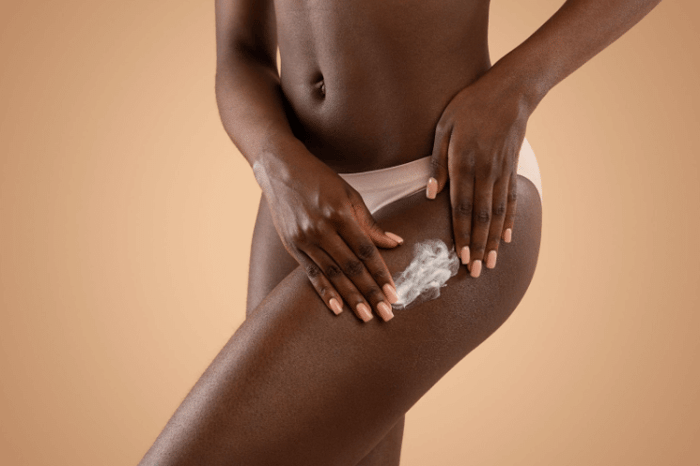Hyperpigmentation can impact various areas of the skin, and one of the most tricky is the bikini line, particularly in Black skin. It can cause a dip in self-confidence, especially if, for example, you're looking to feel comfortable on a beach in a tropical climate.
Finding the most suitable hyperpigmentation bikini line treatment can also be tricky, as you don't want to choose a harsh method that irritates you further.
Thankfully, Ava Estell has an impressive range of naturally curated hyperpigmentation bikini line products that work on even the most sensitive areas of your body.
Let's dive into ways to treat the bikini line area and look into the most common causes and myths associated with this well-known skin concern.
[Disclaimer: Our guide provides a general overview of hyperpigmentation on the bikini line in dark-skinned individuals. We'll outline the ways to treat it naturally with Ava Estell products. If you want to know more about your skin type needs, we suggest consulting a dermatologist.]
Understanding Hyperpigmentation on Bikini Line
Hyperpigmentation bikini line concerns can appear on a multitude of skin types. It may look like dark spots, patches, or even the result of ingrown hairs.
The bikini line is more susceptible to hyperpigmentation because of the areas it's in, which can become irritated if there is a lot of friction or inflammation if the incorrect product touches that sensitive skin area.
Hyperpigmentation on Black Skin
Particularly on Black skin, hyperpigmentation is more common. It's a skin condition where excess melanin is produced. It can result in ingrown hairs and stubborn dark spots due to dead cells that need to be exfoliated and renewed.
Common Causes of Bikini Line Hyperpigmentation
So, what are the most common bikini line hyperpigmentation causes on dark skin tones?
Hormonal Influences: A hormonal imbalance in women could cause unwanted melanin production. This could be due to pregnancy or contraceptive methods.
Friction: Tight clothing is known to darken patches on the skin. The skin around the bikini area is quite delicate, so clothing rubbing against it can irritate and cause redness.
Sun exposure: Too much time in the sun leads to skin irritation and sun damage. UV exposure can cause the skin to burn or more severe skin conditions if not treated properly.
Skin reaction: Post-inflammatory hyperpigmentation is also prevalent in producing dark spots around the bikini area. For example, you may use hair removal methods, but there could be side effects causing dry skin, irritation, and redness.
Myths and Misconceptions about Hyperpigmentation on Bikini Line
We outlined a few myths and misconceptions of women with hyperpigmentation bikini line concerns.
- Hyperpigmentation is permanent. False. It's a surface-level skin concern that you can treat, even the most stubborn dark patches.
- Only shaving causes hyperpigmentation. False. It may cause irritation and inflammation if not done correctly. But it isn't the sole cause of dark spots. Skin type and aftercare are also factors.
- Hyperpigmentation bikini line concerns are only cosmetic. False. An underlying skin condition or medical issue can affect the area too.
Treatment Options for Hyperpigmentation in the Bikini Line
Some hyperpigmentation bikini line treatments improve the appearance of dark marks, acne scars, and discoloured patches. However, they may not be suited for sensitive skin or darker skin types.
You may need to consult with a dermatologist about whether the method would be the right choice for you, including:
Hyperpigmentation Bikini Line Laser Treatment
Laser treatment is a popular bikini line hyperpigmentation treatment. However, not every laser treatment is tailored to the prevalent melanin pigment in darker skin tones.
Hyperpigmentation Bikini Line Dermatologist Treatments
Common skin concerns like hyperpigmentation may benefit from professional hyperpigmentation bikini line treatments. However, these don't always use natural ingredients.
And the ingredients they do have, like in chemical peels, can be irritants to certain darker skin types. For example, researching glycolic acid and salicylic acid before you try a treatment can avoid unwanted side effects.
Home Remedies for Hyperpigmentation on Bikini Line
Some ways to remedy hyperpigmentation bikini lines could be found in your home. Although it may take a while longer to see results, you can consider these products:
Natural Hyperpigmentation Bikini Line Remedies
- Aloe vera gel: It's an anti-inflammatory to help reduce pigmentation. It can be applied daily to the area to reduce irritation.
- Turmeric: This is a well-known skin-lightening agent. When mixed with water, it can produce a paste and be left on the area for up to twenty minutes before rinsing.
- Coconut oil: This helps hydrate the area and can be applied with our combination of Ava Estell recommendations below.
Skincare Products for Managing Hyperpigmentation on Bikini Line
Ava Estell had melanin-rich skin tones in mind when it created its hyperpigmentation bikini line products. You can rest assured that any dark spots or irritation will soon fade with a consistent skincare routine.
Our Ava Estell Recommendations
Start with an exfoliant like the Activating Body Scrub. This will tackle the dead skin cells that cause the bikini line hyperpigmentation to darken. It's a gentle formula with anti-inflammatory cocoa butter to soothe and hydrate the area.
You can then apply a treatment cream. Our top choice is the Magix Cream. It helps fade the dark marks and helps prevent them from returning thanks to its active vitamin E oil to help boost collagen and renew the skin.
Once your cream has been absorbed, you can end with sun protection, especially in a sunny climate. The Summer Body Cream has zinc oxide to provide full coverage against UV rays.
How to Prevent Hyperpigmentation on Bikini Line
Unfortunately, hyperpigmentation has a way of returning due to its various factors. So, one of the most productive ways to improve it is:
- Exfoliate often
- Treat with a topical cream
- Moisturise the area
- Protect against sun damage
Hyperpigmentation Bikini Line Prevention Tips
We recommend you stick to a consistent routine to achieve the most effective results from Ava Estell's hyperpigmentation range. This way, you're preventing further dark marks and helping:
- Lighten the bikini area
- Provide a more even skin tone
- Brighten the complexion to remove imbalances in skin texture
Closing Thoughts: Say Goodbye to Hyperpigmentation Bikini Line with Ava Estell
Ultimately, bikini line hyperpigmentation is stubborn and unwanted. It can leave you with a lack of self-confidence, but thankfully, it isn't permanent. Dark spots and dark patches are common on Black skin, particularly in sensitive skin areas.
So, why not transform your skincare routine by adding an effective hyperpigmentation bikini line treatment with Ava Estell products? We think you'll find something to give your skin a brighter complexion and a more even skin tone.
If you'd like to discover the most suitable skincare products, check out the entire range on the website today.
Frequently Asked Questions
How do you get rid of hyperpigmentation around the bikini line?
A solid skincare routine can help fade the hyperpigmentation. This includes exfoliating, using a treatment cream, and protecting against the sun.
Why is my bikini line so dark?
Various factors cause skin to darken in the bikini line area, including friction, hair removal treatments, and excess sun exposure.
Can you get rid of dark spots on the bikini line?
Bikini line hyperpigmentation isn't permanent. Although it can be stubborn to fade, it is treatable with a consistent skincare routine.










